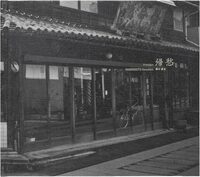$49.53
預訂中,購買後立即進貨
一般需等候約 20 天
- Hardcover
- 252 x 232 mm
- 104 pages
- Japanese and English
Atsushi Fujiwara follows the steps of his grandfather through the south of Japan, guided by his book of Tanka poems called Nangokusho.
In “Nangokusho” there’s a lyrical feeling of loneliness, a quest for lost roots, Atsushi’s eye translates poetic verses in visual imagery, he hunts the invisible, the long gone.
A slow wandering through empty streets, railways and backyards, Nangokusho is a silent ode to the Southern lands of Japan.
“The photographs speak for themselves. In the critique of photography, I make it a general rule to comment on the background from which the photographs arose.
If these were paintings, the past might be portrays from memory or imagination, but as regard this collection, photography will capture only what is currently there.
Today, Kagoshima and beautiful Okinawa are dramatically different from how Tohmon (nd: art-name of Atsushi’s grandfather) saw them, and there is nothing remaining of that now.
Fujiwara Atsushi undertook to pursue sceneries that no longer exist. If the reader should sense a certain emptiness from these photographs, this must be understood to be the emptiness of post-war Japan.”
Extract from Akira Hasegawa’s afterword.






































